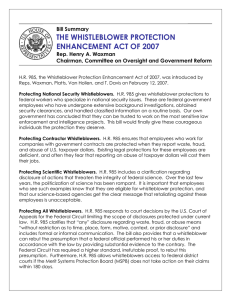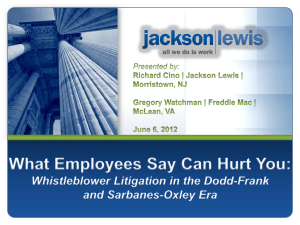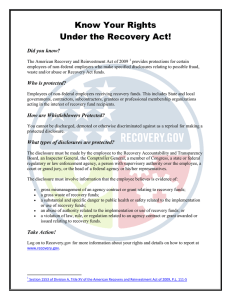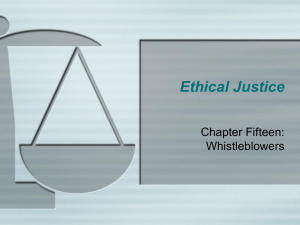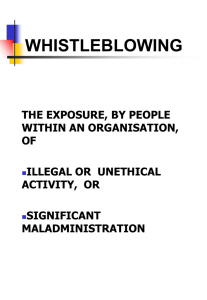Enhanced Protections for Federal- Employee Whistleblowers: Sign of Things to Come?
advertisement
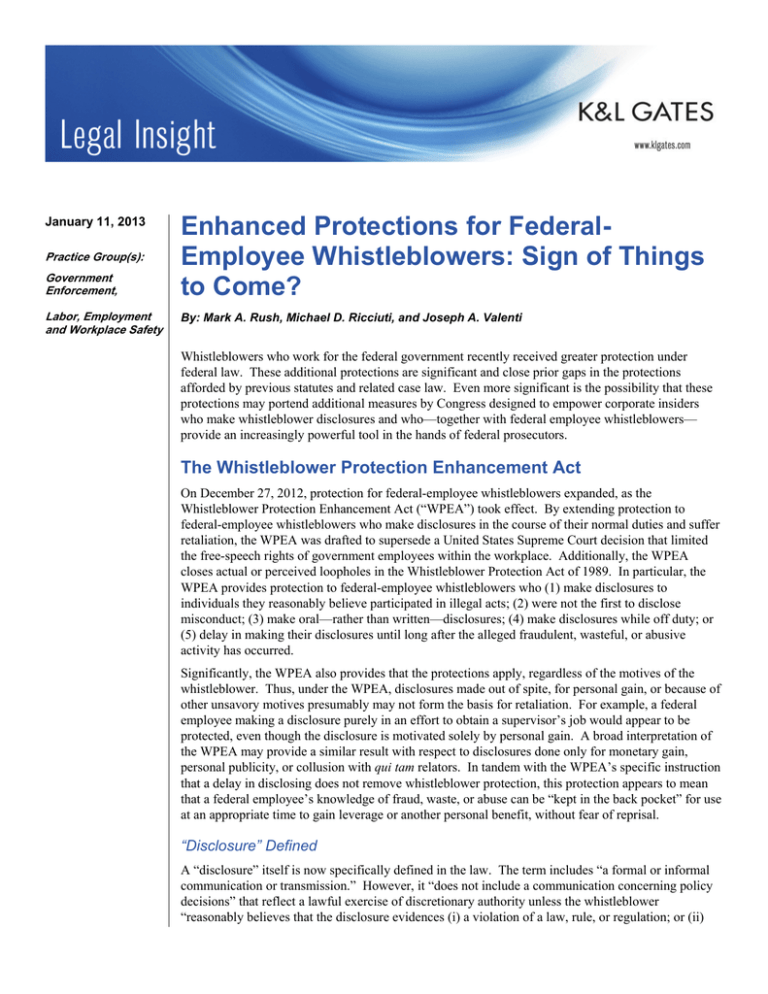
January 11, 2013 Practice Group(s): Government Enforcement, Labor, Employment and Workplace Safety Enhanced Protections for FederalEmployee Whistleblowers: Sign of Things to Come? By: Mark A. Rush, Michael D. Ricciuti, and Joseph A. Valenti Whistleblowers who work for the federal government recently received greater protection under federal law. These additional protections are significant and close prior gaps in the protections afforded by previous statutes and related case law. Even more significant is the possibility that these protections may portend additional measures by Congress designed to empower corporate insiders who make whistleblower disclosures and who—together with federal employee whistleblowers— provide an increasingly powerful tool in the hands of federal prosecutors. The Whistleblower Protection Enhancement Act On December 27, 2012, protection for federal-employee whistleblowers expanded, as the Whistleblower Protection Enhancement Act (“WPEA”) took effect. By extending protection to federal-employee whistleblowers who make disclosures in the course of their normal duties and suffer retaliation, the WPEA was drafted to supersede a United States Supreme Court decision that limited the free-speech rights of government employees within the workplace. Additionally, the WPEA closes actual or perceived loopholes in the Whistleblower Protection Act of 1989. In particular, the WPEA provides protection to federal-employee whistleblowers who (1) make disclosures to individuals they reasonably believe participated in illegal acts; (2) were not the first to disclose misconduct; (3) make oral—rather than written—disclosures; (4) make disclosures while off duty; or (5) delay in making their disclosures until long after the alleged fraudulent, wasteful, or abusive activity has occurred. Significantly, the WPEA also provides that the protections apply, regardless of the motives of the whistleblower. Thus, under the WPEA, disclosures made out of spite, for personal gain, or because of other unsavory motives presumably may not form the basis for retaliation. For example, a federal employee making a disclosure purely in an effort to obtain a supervisor’s job would appear to be protected, even though the disclosure is motivated solely by personal gain. A broad interpretation of the WPEA may provide a similar result with respect to disclosures done only for monetary gain, personal publicity, or collusion with qui tam relators. In tandem with the WPEA’s specific instruction that a delay in disclosing does not remove whistleblower protection, this protection appears to mean that a federal employee’s knowledge of fraud, waste, or abuse can be “kept in the back pocket” for use at an appropriate time to gain leverage or another personal benefit, without fear of reprisal. “Disclosure” Defined A “disclosure” itself is now specifically defined in the law. The term includes “a formal or informal communication or transmission.” However, it “does not include a communication concerning policy decisions” that reflect a lawful exercise of discretionary authority unless the whistleblower “reasonably believes that the disclosure evidences (i) a violation of a law, rule, or regulation; or (ii) Enhanced Protections for Federal-Employee Whistleblowers: Sign of Things to Come? gross mismanagement, a gross waste of funds, an abuse of authority, or a substantial and specific danger to public health or safety.” In addition, the WPEA specifically expands protection to whistleblowers that make disclosures concerning “any effort to distort, misrepresent, or suppress research, analysis, or technical information” that is or will cause a legal violation, gross mismanagement, waste, abuse, or substantial danger. However, protection will not apply for disclosures that reveal classified national-defense or foreign-policy information or that are otherwise prohibited by law. Procedural Changes The WPEA changes certain procedures pertaining to federal-employee whistleblower disclosures, including requiring courts to allow the Office of Special Counsel to file amicus briefs in support of whistleblowers appealing rulings from the Merit Systems Protection Board (“MSPB”). Additionally, appeals of MSPB rulings in whistleblower cases temporarily may be filed in circuits other than the Federal Circuit as part of a two-year test program. For the next five years, agency Inspectors General (outside of the intelligence field) are also required to designate a Whistleblower Protection Ombudsman to educate agency employees about their rights to be protected against retaliation for making a disclosure. Application to TSA – Exclusion of Other Security- or Intelligence-Related Agencies The WPEA expands whistleblower protection to applicants to, and employees of, the Transportation Security Administration. Other intelligence- and security-related agencies remain excluded from whistleblower-protection coverage. Further, revocation of a security clearance as retaliation for a disclosure is still not considered a “prohibited personnel practice.” Superseding Garcetti The WPEA supersedes—at least at the federal level—the United States Supreme Court decision in Garcetti v. Ceballos, 547 U.S. 410 (2006). Garcetti held that the First Amendment did not protect a government employee from discipline based on speech made during the performance of the employee’s official duties. In Garcetti, a government attorney disclosed to his superiors that he believed a search-warrant affiant had made improper misrepresentations to obtain the warrant. The government proceeded with its prosecution after the defendant’s unsuccessful use of the government attorney’s disclosures and testimony. When the government attorney was transferred and denied a promotion, he sued—ultimately losing because “when public employees make statements pursuant to their official duties [such as an attorney advising a supervisor on how to proceed with a case], the employees are not speaking as citizens for First Amendment purposes, and the Constitution does not insulate their communications from employer discipline.” The Garcetti majority feared that “a contrary rule . . . would commit state and federal courts to a new, permanent, and intrusive role, mandating judicial oversight of communications between and among government employees and their superiors in the course of official business.” With the enactment of the WPEA, this fear may be realized, as federal employees who are most likely to be in a position to uncover fraud, waste, and abuse (and be retaliated against for disclosing it) now have explicit statutory protection that will open the doors of the courthouse for them. 2 Enhanced Protections for Federal-Employee Whistleblowers: Sign of Things to Come? Superseding Other Cases The WPEA also supersedes numerous other cases where “loopholes” in the Whistleblower Protection Act were exploited. For instance, Huffman v. Office of Personnel Management, 263 F.3d 1341 (Fed. Cir. 2001), and several predecessor cases held “that complaints to a supervisor about the supervisor’s own conduct are not disclosures covered by the” Whistleblower Protection Act because “[w]hen an employee reports or states that there has been misconduct by a wrongdoer to the wrongdoer [who, by definition, must already know of the misconduct because he engaged in it], the employee is not making a ‘disclosure’ of misconduct.” Though this line of cases also rested on policy arguments that protection should only extend to disclosures that would realistically result in remedying misconduct (and “disclosures” to wrongdoers themselves would be unlikely to do so), the WPEA specifically discredits that policy rationale. Huffman also engaged in a lengthy discussion of how to define “disclosure,” resorting to the dictionary and various statements made on the floor of Congress, among other things. See, e.g., id. at 1354 (“[O]n the floor Representative McCloskey stated: ‘A protected disclosure may be made as part of an employee’s job duties, may concern policy or individual misconduct, and may be oral or written and to any audience inside or outside the agency, without restriction to time, place, motive, or context.’”) (emphasis deleted). Much of this legislative history is now codified in the WPEA to provide courts with clear instructions, rather than leaving them to sift through varying statements of Congressional intent. What’s Next? The enhancements under the WPEA will likely—and in fact are intended to—lead to more federal employees making disclosures that the government will ultimately use to prevent fraud, waste, and abuse. It remains to be seen how the statute will be applied by agency personnel and interpreted by the courts, as well as whether certain perceived “whistleblower abuses” will lead to curbs on the scope of some of the protections. However, one thing seems clear: The statute, which was passed by a unanimous vote, appears to reflect the willingness of Congress to extend substantial benefits and protections to persons who disclose improper or illegal conduct. Accordingly, the WPEA may foreshadow additional enhancements to other whistleblower-protection laws, such as ones that protect private employees who report various forms of employment discrimination, environmental law violations, false claims, and white-collar crimes. The effects of these and other potential whistleblower protections are surely to be felt significantly for years to come. Authors: Mark A. Rush mark.rush@klgates.com +1.412.355.8333 Michael D. Ricciuti michael.ricciuti@klgates.com +1.617.951.9094 Joseph A. Valenti joseph.valenti@klgates.com +1.412.355.8333 3 Enhanced Protections for Federal-Employee Whistleblowers: Sign of Things to Come? Anchorage Austin Beijing Berlin Boston Brisbane Brussels Charleston Charlotte Chicago Dallas Doha Dubai Fort Worth Frankfurt Harrisburg Hong Kong London Los Angeles Melbourne Miami Milan Moscow Newark New York Orange County Palo Alto Paris Perth Pittsburgh Portland Raleigh Research Triangle Park San Diego San Francisco São Paulo Seattle Seoul Shanghai Singapore Spokane Sydney Taipei Tokyo Warsaw Washington, D.C. K&L Gates includes lawyers practicing out of 46 fully integrated offices located in North America, Europe, Asia, South America, Australia, and the Middle East, and represents numerous GLOBAL 500, FORTUNE 100, and FTSE 100 corporations, in addition to growth and middle market companies, entrepreneurs, capital market participants and public sector entities. For more information about K&L Gates or its locations and registrations, visit www.klgates.com. This publication is for informational purposes and does not contain or convey legal advice. The information herein should not be used or relied upon in regard to any particular facts or circumstances without first consulting a lawyer. ©2013 K&L Gates LLP. All Rights Reserved. 4
